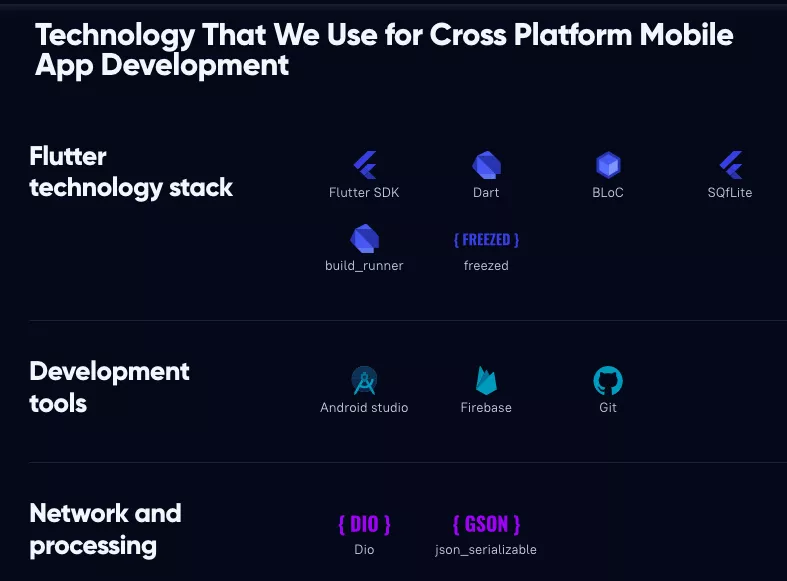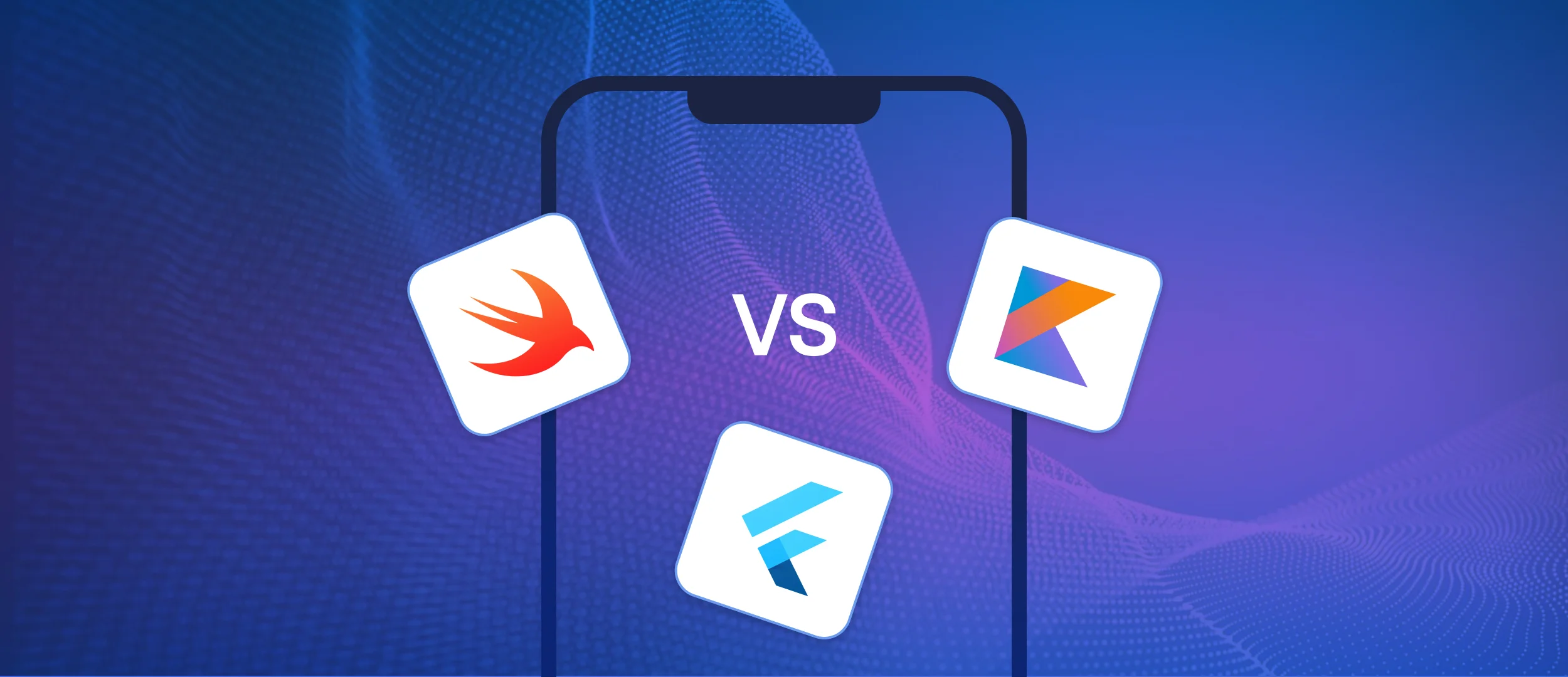
Плануючи крос-платформений застосунок, одним із перших запитань, яке виникає, є: скільки це коштуватиме? Відповідь залежить від таких факторів, як складність застосунка, етапи розробки та додаткові функції. Для бізнесів, які хочуть правильно спланувати бюджет, важливо зрозуміти основні витрати. Це допоможе уникнути непередбачуваних витрат у майбутньому.
Ця стаття глибоко аналізує фактори, що впливають на вартість розробки крос-платформених застосунків. Ми проведемо вас через етапи розробки, порівняємо витрати за типом застосунка та розглянемо стратегії для мінімізації витрат без шкоди для якості. Ви також знайдете приклади з нашого досвіду у створенні економічних, високопродуктивних крос-платформених застосунків.
В кінці ви зрозумієте, що впливає на витрати на розробку, і отримаєте практичні поради для прийняття розумних рішень для вашого бізнесу.
Stfalcon розробляє програмне забезпечення для наших клієнтів у Європі та США з 2009 року. Ми маємо великий досвід створення крос-платформених застосунків для різних галузей, які відповідають складним бізнес-потребам та дозволяють оптимізувати бюджет. Наші фахівці завжди готові проконсультувати вас щодо витрат на ваш майбутній проект крос-платформеного застосунка.
Як розрахувати вартість розробки крос-платформеного мобільного застосунка
Немає короткої відповіді на запитання, скільки коштує крос-платформений мобільний застосунок, оскільки ціни можуть коливатися від $30k до $200k або навіть більше. Це залежить від таких факторів, як складність, тип застосунка та функції, які ви хочете бачити у своєму рішенні.
Щоб отримати більш-менш точну оцінку вартості, ви можете скористатися онлайн калькулятором цін, який дасть вам базове уявлення про те, скільки може коштувати ваш проект, враховуючи платформу та основні функції. Проте, щоб отримати повну картину, вам також потрібно врахувати наступні фактори:
- складність дизайну та кількість екранів
- кількість та складність функцій і можливостей
- деталі процесу розробки
- підхід до забезпечення якості
- якість бази даних
- інтеграції з третіми сторонами
- впровадження протоколів безпеки (GDPR або HIPAA, наприклад)
- розмір команди розробників та їхній досвід.
Плануєте запуск цифрового продукту?
Розробляємо стабільні та масштабовані веб- і мобільні застосунки для бізнесу.
Аліна
Клієнт-менеджер

Найнадійніший варіант — це зв'язатися з компанією-розробником, з якою ви плануєте співпрацювати, обговорити свою ідею та запитати оцінку проекту. Як досвідчена компанія з крос-платформної мобільної розробки, ми пропонуємо нашим клієнтам найбільш підходящі рішення для задоволення їхніх потреб і часто економимо час та гроші.
Що формує ціну: етапи розробки крос-платформного застосунку
Розуміння того, як створити крос-платформний застосунок, спрощує оцінку вашого проектного бюджету. Давайте розглянемо ключові етапи розробки:
Вибір правильного фреймворку та технологічного стеку
Процес розробки крос-платформного застосунку залежить від вибраної мови програмування та фреймворку. Сьогодні компанії мають широкий вибір популярних варіантів, таких як Flutter, React Native, Ionic, Kotlin Multiplatform та багато інших. Щоб правильно вибрати, вам потрібно глибоко усвідомити свої бізнес-цілі, потреби та вимоги. Компанії з розробки крос-платформних застосунків, такі як Stfalcon, можуть надати вам технологічний стек, щоб забезпечити максимальну продуктивність та розширені функції.

Вибір правильного фреймворку та інструментів для розробки є важливим, оскільки це може допомогти вам заощадити гроші та уникнути повторної роботи в майбутньому.
Розробка з урахуванням кількох версій
У крос-платформній мобільній розробці важливо пам'ятати про проектування змінних розмірів екранів і роздільної здатності, оскільки потрібно створити кілька макетів і зручний інтерфейс для кожної платформи. Користувачі Android, наприклад, віддають перевагу використанню кнопок на екрані, тоді як фанати iOS працюють з жестами сенсорного екрану.
Тестування та налагодження
Коли ваш застосунок нарешті буде створено, час переконатися, що він працює належним чином, тому вам потрібно його протестувати та налагодити. Різні платформи потребують різних методів тестування. Обов'язково враховуйте всі деталі та тестуйте застосунок на якомога більшій кількості пристроїв і налаштувань. Враховуйте різні версії ОС, розміри екранів, апаратні специфікації тощо.
Випуск та розгортання
Коли забезпечено безперебійну роботу вашого рішення, час його опублікувати. Щоб опублікувати та провести випуски нового мобільного рішення, ви повинні знати ринки та платформи, а також їх вимоги та рекомендації. Саме тому Stfalcon завжди допомагає нашим клієнтам на цьому етапі. Як тільки застосунок буде схвалено, користувачі зможуть його завантажити, а ви зможете його просувати та рекламувати.
Підтримка та обслуговування
З крос-платформним застосунком ви повинні очікувати, що він вимагатиме більше оновлень і обслуговування через оновлення операційних систем, які можуть суттєво відрізнятися для кожної системи.
Команда Stfalcon завжди пропонує підтримку нашим клієнтам, щоб встигати за змінами та оновленнями. Вам потрібно регулярно тестувати своє рішення після оновлень платформи та мобільної системи, щоб перевірити його правильну роботу.
Скільки коштує створення крос-платформного застосунку?
Вартість розробки крос-платформного застосунку за типом застосунку
Ви вже знаєте про численні фактори, які впливають на вартість розробки застосунків. Але який з них є вирішальним, і з чого почати розрахунок?
Щоб зробити найосновніші оцінки, вам потрібно врахувати складність вашого застосунку. Ось кілька середніх цін, на які ви можете орієнтуватися, залежно від розміру та складності вашого проекту:
- Базовий: 30 000 $ +
- Середній: 80 000 $ +
- Рівень підприємства: 150 000 $ +
Коли ви працюєте з компанією з аутсорсингу програмного забезпечення, запитайте про чіткий список їхніх витрат на розробку застосунків перед підписанням контракту. Це забезпечить прозорий процес і надасть вам найяснішу уяву про те, скільки вам доведеться заплатити.
Додаткові витрати, які можуть виникнути
Незалежно від того, наскільки ретельно ви плануєте обсяг свого проекту, завжди слід бути готовим до змін і непередбачених витрат, які важко передбачити на початку. Ось кілька прикладів того, з чим ви можете зіткнутися в процесі:
- Нова функціональність. Під час процесу розробки крос-платформного мобільного застосунку можуть виникнути додаткові потреби, які ви не могли передбачити через відсутність чіткої візії на початку. Це можуть бути нові функції або інтеграції з третім сторонами, які ви не очікували.
- Зміна вимог. Функціональні або бізнес-вимоги можуть змінитися, тому необхідно їх проаналізувати та оновити оцінку вартості проекту.
- Сертифікації. Юридичні вимоги можуть вимагати сертифікацій безпеки, наприклад, відповідно до стандартів ISO. Це може бути включено в початкову ціну або стягуватися додатково.
- Хмарні сервіси. Вартість хмарних сервісів важко передбачити поза базовими оцінками, оскільки вона безпосередньо залежить від навантаження. У цьому випадку остаточна ціна зазвичай стає зрозумілою після випуску.
Розумно сприймати проекти як такі, що мають свої власні життєві цикли, де все може змінитися кілька разів, і прийняти гнучкий підхід. У Stfalcon ми дотримуємося методології Agile і завжди готові адаптуватися до динамічних вимог.
Способи зменшити витрати на розробку крос-платформних застосунків
- Встановіть пріоритети. Визначте чіткий обсяг вашого проекту та пріоритетизуйте ключові функції.
- Використовуйте наявні інструменти та технології. Використовуйте інструменти з відкритим кодом, щоб зменшити витрати на ліцензування, та інтегруйте готові бібліотеки для прискорення розробки.
- Оптимізуйте дизайн та користувацький досвід. Пріоритетизуйте користувацький досвід, щоб мінімізувати потребу у майбутніх редизайнах. Також тримайте ваш інтерфейс простим і інтуїтивно зрозумілим, уникаючи складних дизайнів, які потребують значних зусиль для розробки.
- Тестуйте ваш застосунок ретельно. Виявляйте та виправляйте помилки на ранніх етапах розробки, щоб уникнути дорогих виправлень пізніше.
- Спробуйте аутсорсинг. Замість того, щоб нарощувати або масштабувати свою внутрішню команду, ви можете делегувати процес розробки надійному партнеру з аутсорсингу.
Сьогодні аутсорсинг є одним із найпростіших способів отримати функціональний застосунок, забезпечуючи високу якість, швидкість і розумну ціну. Stfalcon має 16-річний досвід у розробці програмного забезпечення високої якості для наших клієнтів у різних галузях. Ми будемо раді підтримати вас на всьому етапі створення вашого застосунку та допомогти вам зосередитися на основних цілях. Дозвольте нам надати вам кілька основних моментів нашої роботи, щоб ви отримали уявлення про те, що ми можемо запропонувати.
Кейси розробки Stfalcon Cross-Platform
BingeBooks
BingeBooks — це онлайн-спільнота авторів та любителів книг з власним вебсайтом. Вони звернулися до Stfalcon для розробки мобільного застосунку для Android та iOS, щоб відкривати нові твори, авторів та жанри, а також обмінюватися відгуками та рекомендаціями.
Щоб швидше запустити застосунок, ми зосередилися лише на основній функціональності — пошук контенту, перегляд книг та управління списком користувачів. Ми обрали крос-платформенний фреймворк Flutter, щоб одночасно створювати рішення для iOS та Android та мінімізувати витрати на розробку. Крім того, Flutter дозволяє за необхідності розширити існуючі застосунки на настільні платформи.
Ми використали найбільш поширений шаблон BLoC та підхід Clean Architecture, щоб зробити застосунок легким у підтримці та тестуванні. Нам потрібно було інтегрувати нашу роботу з бекендом клієнта, для чого ми використали Dio. Клієнт захоплювався роботою Stfalcon на кожному етапі, навіть у стресових ситуаціях.
Програмне забезпечення для управління ланцюгом постачання ресторанів
Цей проект під NDA, але ми поділимося деякими деталями.
Партнери звернулися до Stfalcon, шукаючи команду розробників для однієї з найбільших компаній з доставки їжі у світі. Замовлення компанії перевищували 500 мільйонів на рік, що призводило до проблем у спілкуванні між постачальниками їжі та ресторанами. Тож їм потрібен був ефективний інструмент для B2B замовлень.
Ми використали простий, але ефективний метод створення чатів з каталогом продуктів та можливістю робити замовлення, як одноразово, так і повторно.
Оскільки мережа складається з понад 500 000 ресторанів у всьому світі, не кажучи вже про постачальників, усі вони використовують різні канали зв’язку. Тож нашою метою було інтегрувати якомога більше сервісів для забезпечення безперебійної взаємодії користувачів.
Команда розробників обрала Flutter у нашій розробці як найсучасніший фреймворк для крос-платформених рішень. Для каталогу та чату були обрані готові сервіси Shopify.com та Stream.io. Це дозволило нам швидко випустити MVP.
Співпраця з командою віддаленого партнера проходила безперешкодно та була надзвичайно продуктивною, оскільки ми мали однаковий технічний стек. Наша річна співпраця призвела до створення продукту високої якості для півмільйона ресторанів, а також ми здобули новий досвід з популярним сервісом Shopify.
Останнє слово
Крос-платформений застосунок — це ідеальний засіб для максимального охоплення аудиторії та, відповідно, для зростання вашого бізнесу або успішного запуску стартапу. Якщо у вас були сумніви, сподіваємося, вони тепер розвіяні.
Ви вже маєте загальне уявлення про те, скільки коштує крос-платформений мобільний застосунок. Але якщо ви хочете дізнатися точну ціну для вашого проєкту, зв'яжіться з експертом Stfalcon для консультації. Ми знаємо, як забезпечити вигідні результати для наших клієнтів з крос-платформенними рішеннями, що працюють на кількох пристроях. Ми можемо це зробити для вас!
Питання та відповіді
Скільки коштує застосунок на основі штучного інтелекту?
Ціни на створення застосунку, заснованого на штучному інтелекті, починаються від 40 000 доларів і залежать від типу ШІ, складності інтеграції, обсягу даних та всіх факторів, які формують ціну звичайного застосунку.
Скільки коштує підтримка мобільного застосунку?
Витрати будуть варіюватися в залежності від розміру команди, що підтримує проєкт, та обсягу їхніх завдань. Наприклад, Stfalcon пропонує різні пакети підтримки відповідно до потреб наших клієнтів. Щомісячна ціна починається від 1000 доларів і включає в себе підтримку інфраструктури, моніторинг проблем, реагування на проблеми, оновлення застосунку до нових версій ОС та інше.
Чи дорожче розробляти крос-платформені застосунки?
Крос-платформена розробка насправді є дешевшою та швидшою, ніж нативна розробка. Вам потрібно створити все лише один раз, а потім ви можете запускати свій застосунок на кількох платформах з одного кодового бази. Ось чому в Stfalcon ми пропонуємо крос-платформенні рішення як бюджетні варіанти.

 Читати кейс
Читати кейс
 Читати кейс
Читати кейс


